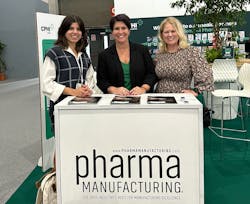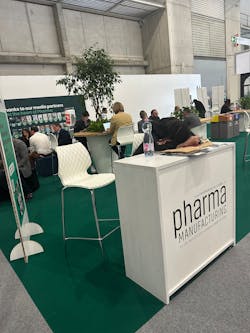Editors (re)View: Innovative takeaways from CPHI
Here at Pharma Manufacturing, we always have an eye out for new ideas, but our innovation focus is especially sharp in the fall, as we assemble and finalize our annual Pharma Innovation Awards. So with innovation top-of-mind, the staff of Pharma Manufacturing spent the last three days at CPHI in Barcelona, and the 1800+ exhibitor show did not disappoint. Here are some favorite highlights from our editors.
The opening day of CPHI is always unique. This year it came with dueling violinists, stilt walkers, break dancing, a somewhat overzealous ribbon-cutting (does it take 7 people to cut a ribbon?) and of course, the annual Pharma Awards ceremony.
Running a publication that focuses primarily on the pharma plant floor, I was particularly keen on which company would take the ‘Manufacturing Excellence’ category at the awards.
The honor went to Minnesota-based Luminary Therapeutics, a clinical stage CAR-T therapy company with a novel allogeneic manufacturing platform. The company’s winning platform, Gamma 2.0+, focuses on addressing the many challenges facing CAR-T therapies. The FDA has now approved six CAR-T cell therapies to treat various types of blood cancers. While CAR-T cell therapies have the potential to be revolutionary in cancer care, scaling out manufacturing so that it’s accessible to more patients, as well as high costs of production and long lead times contribute to delays in administering the therapies.
Luminary, however, takes a unique approach to building an allogeneic cell therapy based on gamma delta cells. The company’s winning allogenic platform decreases dosing delays while improving manufacturing economies of scale. It is designed to cost- effectively deliver large, complex DNA cargo. Ultimately, the platform aims to bring allogeneic cell therapies into the marketplace for under $10,000 — a feat worthy of acknowledgement.— Karen LanghauserA peek into the future of small batch manufacturing
Among the standout innovations seen on the show floor, the Versynta microBatch took center stage. Designed to ensure quick batch-to-batch transitions and minimize product wastage, the machine is a result of a partnership between Vetter and Syntegon, offering a gloveless, compact working cell that excels in robotic precision on a smaller scale.
With the growing demand for reduced batch sizes, this fully automated system efficiently manages aseptic and high-potency micro-batches, and points to a future in which personalized medicines and patients are closer than ever. Key advantages of the Versynta microBatch include its gloveless isolator design, reducing bio-decontamination time, and a unique work cell approach that manages air quality without the need for an external building interface, making it ideal for clinical settings.
The system offers a high degree of standardization, ensuring rapid installation and validation. As a fully automated robotic solution, it is well-suited for applications such as cell and gene therapy, as well as start-ups, offering a high degree of flexibility. The machine is also equipped to handle a wide range of RTU containers, including syringes, cartridges, and vials, accommodating classical stoppers, caps, and press-on caps. It ensures maximum security with 100% in-process control, making it well-prepared for aseptic and high-potency production. — Andrea Corona
Also, the entire staff of Pharma Manufacturing would like to give a shoutout to our mysterious ‘tradeshow Goldilocks,’ who, after trying our many booths, found that ours was ‘just right’ for her afternoon siesta!
About the Author
Andrea Corona
Senior Editor
Karen P. Langhauser
Chief Content Director, Pharma Manufacturing
Karen currently serves as Pharma Manufacturing's chief content director.
Now having dedicated her entire career to b2b journalism, Karen got her start writing for Food Manufacturing magazine. She made the decision to trade food for drugs in 2013, when she joined Putman Media as the digital content manager for Pharma Manufacturing, later taking the helm on the brand in 2016.
As an award-winning journalist with 20+ years experience writing in the manufacturing space, Karen passionately believes that b2b content does not have to suck. As the content director, her ongoing mission has been to keep Pharma Manufacturing's editorial look, tone and content fresh and accessible.
Karen graduated with honors from Bucknell University, where she majored in English and played Division 1 softball for the Bison. Happily living in NJ's famed Asbury Park, Karen is a retired Garden State Rollergirl, known to the roller derby community as the 'Predator-in-Chief.'


